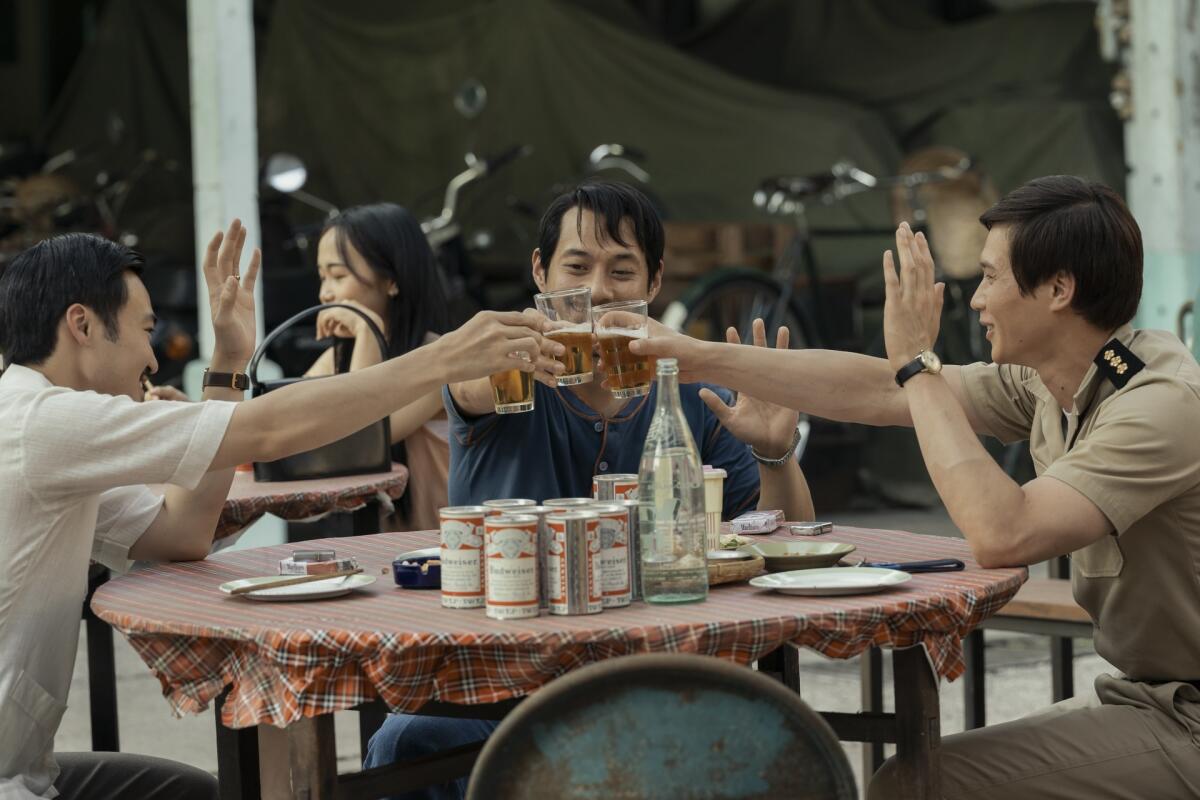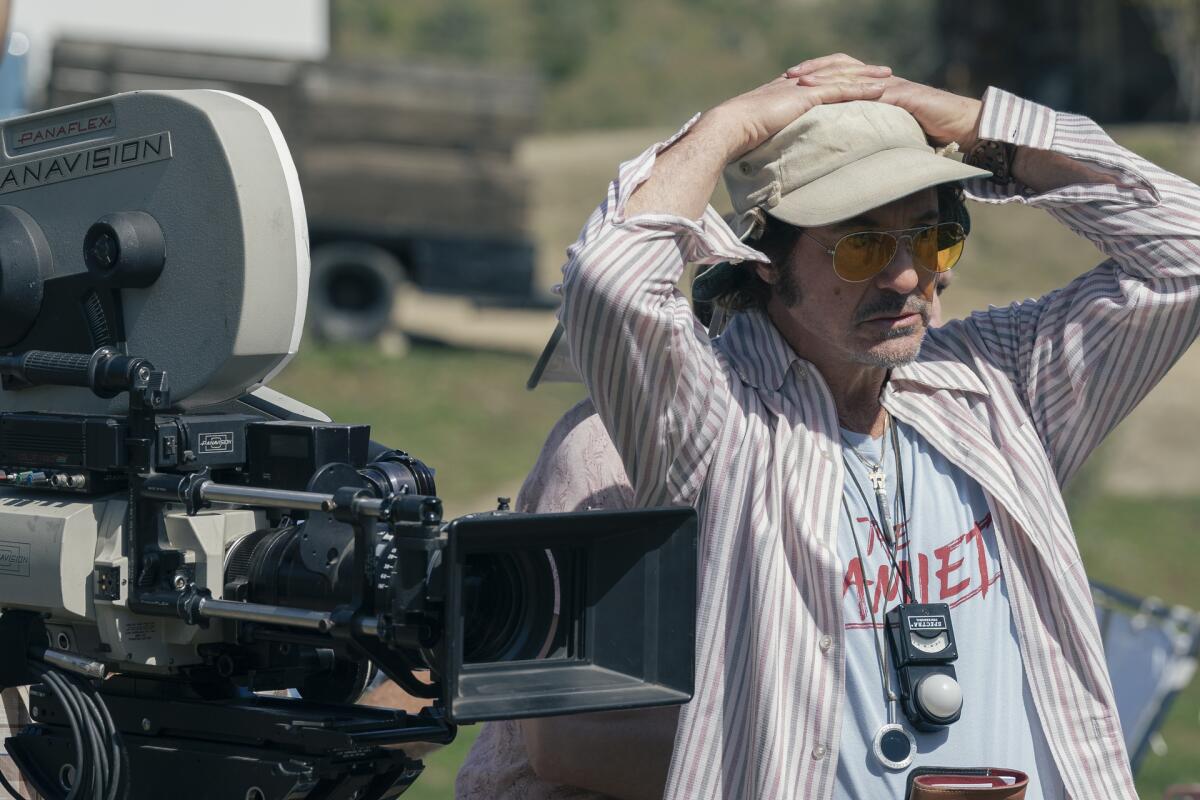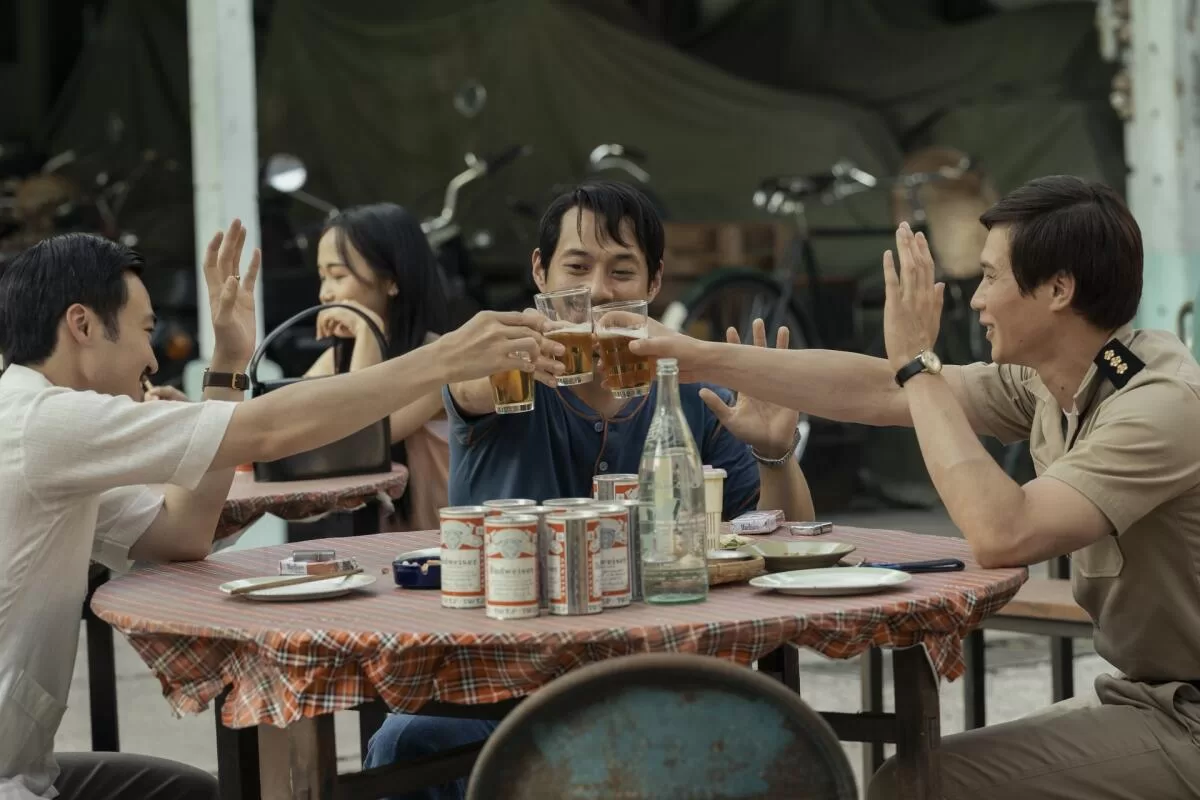Such tension-added-to-tension animates “The Sympathizer,” a serious black comedy premiering Sunday at 9 p.m Pacific on HBO. (It’s no less tense for being a comedy.) Adapted by Park Chan-wook, who also directs the first three episodes, and Don McKellar from Viet Thanh Nguyen’s Pulitzer Prize-winning novel, and set in the near aftermath of the Vietnam War — the American War, they called it in Vietnam — it’s the portrait of a divided people and a divided person. The main character, called only the Captain (Hoa Xuande), is a “sympathizer” both in the American construction of “communist sympathizer” and as someone who can see both sides of a story — not necessarily the best quality, psychologically speaking, for a spy.
When we meet him, on the eve of the fall of Saigon — terrifyingly re-created — the Captain is a North Vietnamese mole working for South Vietnam’s secret police, under the General (Toan Le), in whose house he lives alongside the General’s wife, Madame (Nguyen Cao Ky Duyen), and daughter, Lana (Vy Le), an aspiring singer who in her head is already living in the United States. Much to his displeasure, he is ordered to travel to America to continue keeping tabs on the General, whose paranoia he must allay and whose developing plans seem to support. His war carries on.
The Captain is a split personality in other ways. He attended college in America, speaks English fluently, likes funk and soul music. He’s biracial, the illegitimate son of a Vietnamese mother (deceased) and a French father, who remains shadowy until near the end of the series. As a child he’s called “half-breed” and beaten up. (“You’re not half of anything,” says his mother. “You’re twice of everything.”) As an adult, he’s called a bastard.

(Hopper Stone / HBO)
Nevertheless, he acquires two boyhood friends — together they style themselves the Three Musketeers — Man (Duy Nguyễn), who will also end up working undercover for the Viet Cong, and Bon (Fred Nguyen Khan), who has no idea what his friends are up to and will carry a heavy load of trauma into his American second act. More than anything, it’s their relationships that drive the series, which, for all its many themes and observations, turns out to be, most movingly, a story of friendship.
As a kind of counterpart to the Captain’s mental division, Robert Downey Jr. plays four characters who might be seen as one, in that they’re all aspects of American self-importance. These are the series’ most baldly comic figures — caricatures, but played with commitment. We’ll see them assembled together at the same table in one scene, set in “the natural habitat of the most dangerous creature on earth, the white man in a suit and tie — the steakhouse.”
There is Claude, a CIA agent, with whom the Captain, in his secret police guise, works in Saigon, and who turns up in Los Angeles, walking a variety of dogs for cover. Hammer, his former college professor, the chair of an “Oriental Studies” department, regards the Captain as a sort of pet. (Sandra Oh plays his assistant, and a love interest for the Captain.) Ned Godwin is a right-wing blowhard and Vietnam vet in whose congressional campaign the Captain becomes tangentially involved. (“Delighted to have an ethnic on the trail. Do you have skills other than being Vietnamese?”) And finally there is Nikos, called the Auteur in the novel, who is making a Vietnam movie, “The Hamlet” — it’s Nguyen’s riff on “Apocalypse Now” — and hires the Captain as an “authenticity consultant.” Giving the Vietnamese characters some lines, the Captain suggests, would be a start.

Robert Downey Jr. as Nikos, the Auteur, one his four characters in “The Sympathizer.”
(Hopper Stone / HBO)
The film within the film, which occupies an entire episode, allows for some familiar jabs at Hollywood types, practices and pretensions — and the less familiar plight of the Asian actor. It brings in David Duchovny as a “legendary method icon,” Maxwell Whittington-Cooper as a soul singer cast in the film, and John Cho as an actor whose previous roles include “the Chinese railroad worker who got stabbed by Ernest Borgnine [and] the Japanese soldier who got shot by Sinatra” and is playing a Korean for the first time.
As a television entertainment — and it is an entertainment, and a successful one, more than it is a history lesson — “The Sympathizer” necessarily telescopes plot and summarizes and externalizes ideas Nguyen turns over and over again in the book. (Nothing in the text suggests that Downey, or anyone, would play four characters, but it’s, you know, a concept.)
The novel takes the form of a written confession, a manuscript in the form of a manuscript, on which the Captain has been working in solitary confinement for a year; his interlocutor gives him notes on style and sends him back for further drafts. (“Were the ghosts there as literary symbols, or as genuine superstitious indulgences?”) The Captain narrates the series as well, at once addressing the audience and his editor, with asides like, “I know what you’re thinking. Yes, I’m recounting something I didn’t actually witness myself. Forgive me. Some of the dialogue is conjecture but it helps to explain the events that follow,” and “I don’t think this scene is extraneous, but if it offends you, feel free to skip it.”
Apart from Duchovny, Downey is the only white actor, and one of the few non-Asian actors, with anything to do here, but it would be a mistake (note to editor) to make him the headline. His characters are more symbolic than anything — in their settled arrogance immune to any sort of self-interrogation or change — while everything of real interest happens to the Vietnamese characters and within the Vietnamese community, which, obviously, is not monolithic, and not at all settled.
In America, “they eat your heart, then complain of indigestion,” complains the General, not adjusting to his new circumstances. By contrast, an entrepreneurial ex-major will tell the Captain, “If you fully commit to this land, you become fully American, but if you don’t you’re just a wandering ghost living between two worlds, forever.” And while the series concentrates on the powerful — and formerly powerful — Park also does a fine job of evoking the ordinary, healthy community around them, establishing itself anew at various events and gatherings. It’s not a world we’ve seen in a big-budget, big-deal TV series; there are more stories to tell there.
